H.-J. Stockmann
Philipps-Universitat Marburg, Germany
Quantum Chaos
An Introduction
Paperback (ISBN-10: 0521027152 | ISBN-13: 9780521027151)
February 2006
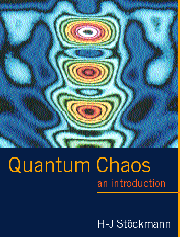 This book introduces the quantum mechanics of classically chaotic
systems, or Quantum Chaos for short. The authorfs philosophy
has been to keep the discussion simple and to illustrate theory,
wherever possible, with experimental or numerical examples. The
microwave billiard experiments, initiated by the author and his
group, play a major role in this respect. Topics covered include
the various types of billiard experiment, random matrix theory,
systems with periodic time dependences, the analogy between the
dynamics of a one-dimensional gas with a repulsive interaction
and spectral level dynamics, where an external parameter takes
the role of time, scattering theory distributions and
fluctuation, properties of scattering matrix elements,
semiclassical quantum mechanics, periodic orbit theory, and the
Gutzwiller trace formula. This book will be of great value to
anyone working in quantum chaos.
This book introduces the quantum mechanics of classically chaotic
systems, or Quantum Chaos for short. The authorfs philosophy
has been to keep the discussion simple and to illustrate theory,
wherever possible, with experimental or numerical examples. The
microwave billiard experiments, initiated by the author and his
group, play a major role in this respect. Topics covered include
the various types of billiard experiment, random matrix theory,
systems with periodic time dependences, the analogy between the
dynamics of a one-dimensional gas with a repulsive interaction
and spectral level dynamics, where an external parameter takes
the role of time, scattering theory distributions and
fluctuation, properties of scattering matrix elements,
semiclassical quantum mechanics, periodic orbit theory, and the
Gutzwiller trace formula. This book will be of great value to
anyone working in quantum chaos.
* First book treating both experimental and theoretical aspects
of quantum chaos
* First-hand information on billiard experiments initiated by the
author
* First introduction on supersymmetry techniques
Contents
1. Introduction; 2. Billiard experiments; 3. Random matrices; 4.
Floquet and tight-binding systems; 5. Eigenvalue dynamics; 6.
Scattering systems; 7. Semiclassical quantum mechanics; 8.
Applications of periodic orbit theory.
Donald B. Percival / University of Washington and Mathsoft, Seattle
Andrew T. Walden / Imperial College of Science, Technology and Medicine,
London
Wavelet Methods for Time Series Analysis
Paperback (ISBN-10: 0521685087 | ISBN-13: 9780521685085)
March 2006
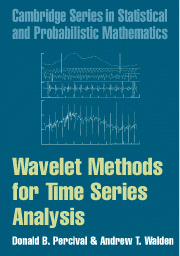 Data in the form of time series are routinely collected in
science, engineering, and other areas such as finance and
economics. This is an introduction to wavelet analysis efrom
the ground level and upf, and to wavelet-based statistical
analysis of time series. It focuses on practical discrete time
techniques, with detailed descriptions of the theory and
algorithms needed to understand and implement the discrete
wavelet transforms. Numerous examples illustrate the techniques
on actual time series. The many embedded exercises - with full
solutions provided in the Appendix - allow use of the book for
self-guided study; additional exercises can be used in a
classroom setting. A Web site gives access to the time series and
wavelets used in the book, as well as information on accessing
software in S-Plus and other languages. This book will be
welcomed by all students and researchers wishing to use wavelet
methods to analyse time series.
Data in the form of time series are routinely collected in
science, engineering, and other areas such as finance and
economics. This is an introduction to wavelet analysis efrom
the ground level and upf, and to wavelet-based statistical
analysis of time series. It focuses on practical discrete time
techniques, with detailed descriptions of the theory and
algorithms needed to understand and implement the discrete
wavelet transforms. Numerous examples illustrate the techniques
on actual time series. The many embedded exercises - with full
solutions provided in the Appendix - allow use of the book for
self-guided study; additional exercises can be used in a
classroom setting. A Web site gives access to the time series and
wavelets used in the book, as well as information on accessing
software in S-Plus and other languages. This book will be
welcomed by all students and researchers wishing to use wavelet
methods to analyse time series.
* Concentrates on the analysis of discrete-time time series,
integrating algorithmic and statistical methodology
* Extensive analyses of significant and interesting data sets
with emphasis on methods found to work well in practice
* Numerous exercises, many with full solutions in book or on WWW
plus related Web site describing how to get S+ software
appropriate for various parts of the book
Contents
1. Introduction to wavelets; 2. Review of Fourier theory and
filters; 3. Orthonormal transforms of time series; 4. The
discrete wavelet transform; 5. The maximal overlap discrete
wavelet transform; 6. The discrete wavelet packet transform; 7.
Random variables and stochastic processes; 8. The wavelet
variance; 9. Analysis and synthesis of long memory processes; 10.
Wavelet-based signal estimation; 11. Wavelet analysis of finite
energy signals; Appendix. Answers to embedded exercises;
References; Author index; Subject index.
Guillermo Sapiro
University of Minnesota
Geometric Partial Differential Equations and Image Analysis
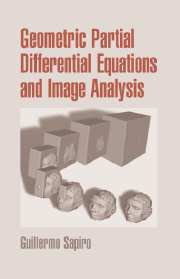 Paperback (ISBN-10: 0521685079 | ISBN-13: 9780521685078)
Paperback (ISBN-10: 0521685079 | ISBN-13: 9780521685078)
March 2006
This book provides an introduction to the use of geometric
partial differential equations in image processing and computer
vision. This research area brings a number of new concepts into
the field, providing a very fundamental and formal approach to
image processing. State-of-the-art practical results in a large
number of real problems are achieved with the techniques
described in this book. Applications covered include image
segmentation, shape analysis, image enhancement, and tracking.
This book will be a useful resource for researchers and
practitioners. It is intened to provide information for people
investigating new solutions to image processing problems as well
as for people searching for existent advanced solutions.
* Covers both theory and applications, with a good coverage of
the state-of-the-art literature
* First to cover many aspects of the topic, not just the
numerical or filtering component
* Useful resource both for experts and newcomers into the field
Contents
1. Basic mathematical background; 2. Geometric curve and surface
evolution; 3. Geodesic curves and minimal surfaces; 4. Geometric
diffusion of scalar images; 5. Geometric diffusion of vector
valued images; 6. Diffusion on non-flat manifolds; 7. Contrast
enhancement; 8. Additional theories and applications.
Dorian Goldfeld
Columbia University, New York
Automorphic Forms and L-Functions for the Group GL(n,R)
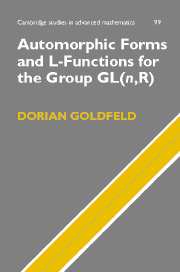 Series: Cambridge Studies in Advanced Mathematics (No. 99)
Series: Cambridge Studies in Advanced Mathematics (No. 99)
Hardback (ISBN-10: 0521837715 | ISBN-13: 9780521837712)
June 2006
L-functions associated to automorphic forms encode all classical
number theoretic information. They are akin to elementary
particles in physics. This book provides an entirely self-contained
introduction to the theory of L-functions in a style accessible
to graduate students with a basic knowledge of classical
analysis, complex variable theory, and algebra. Also within the
volume are many new results not yet found in the literature. The
exposition provides complete detailed proofs of results in an
easy to read format using many examples and without the need to
know and remember many complex definitions. The main themes of
the book are first worked out for GL(2,R) and GL(3,R), and then
for the general case of GL(n,R). In an appendix to the book, a
set of Mathematica functions is presented, designed to allow the
reader to explore the theory from a computational point of view.
* Gives complete detailed proofs of results in an easy to read
format
* Entirely self-contained introduction to the theory of L-functions,
accessible to graduate students
* Includes an appendix of Mathematica functions, to let readers
explore the subject computationally
Contents
Introduction; 1. Discrete group actions; 2. Invariant
differential operators; 3. Automorphic forms and L-functions for
SL(2,Z); 4. Existence of Maass forms; 5. Maass forms and
Whittaker functions for SL(n,Z); 6. Automorphic forms and L-functions
for SL(3,Z); 7. The Gelbert-Jacquet lift; 8. Bounds for L-functions
and Siegel zeros; 9. The Godement-Jacquet L-function; 10.
Langlands Eisenstein series; 11. Poincare series and Kloosterman
sums; 12. Rankin-Selberg convolutions; 13. Langlands conjectures;
Appendix. The GL(n)pack manual; References.
Norman Riley /@Philip Drazin
The Navier-Stokes Equations
A Classification of Flows and Exact Solutions
Series: London Mathematical Society Lecture Note Series (No.
334)
Paperback (ISBN-10: 0521681626 | ISBN-13: 9780521681629)
June 2006
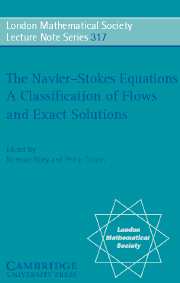 The Navier-Stokes equations were firmly established in the 19th
Century as the system of nonlinear partial differential equations
which describe the motion of most commonly occurring fluids in
air and water, and since that time exact solutions have been
sought by scientists. Collectively these solutions allow a clear
insight into the behavior of fluids, providing a vehicle for
novel mathematical methods and a useful check for computations in
fluid dynamics, a field in which theoretical research is now
dominated by computational methods. This book draws together
exact solutions from widely differing sources and presents them
in a coherent manner, in part by classifying solutions via their
temporal and geometric constraints. It will prove to be a
valuable resource to all who have an interest in the subject of
fluid mechanics, and in particular to those who are learning or
teaching the subject at the senior undergraduate and graduate
levels.
The Navier-Stokes equations were firmly established in the 19th
Century as the system of nonlinear partial differential equations
which describe the motion of most commonly occurring fluids in
air and water, and since that time exact solutions have been
sought by scientists. Collectively these solutions allow a clear
insight into the behavior of fluids, providing a vehicle for
novel mathematical methods and a useful check for computations in
fluid dynamics, a field in which theoretical research is now
dominated by computational methods. This book draws together
exact solutions from widely differing sources and presents them
in a coherent manner, in part by classifying solutions via their
temporal and geometric constraints. It will prove to be a
valuable resource to all who have an interest in the subject of
fluid mechanics, and in particular to those who are learning or
teaching the subject at the senior undergraduate and graduate
levels.
* Draws together exact solutions from widely differing sources
and presents them in a coherent manner
* Will prove a valuable resource to all who have an interest in
the subject of fluid mechanics
* Suitable for graduate and advanced undergraduate students
Contents
Preface; 1. Scope of the book; 2. Steady flows bounded by plane
boundaries; 3. Steady axisymmetric and related flows; 4. Unsteady
flows bounded by plane boundaries; 5. Unsteady axisymmetric and
related flows.
 This book introduces the quantum mechanics of classically chaotic
systems, or Quantum Chaos for short. The authorfs philosophy
has been to keep the discussion simple and to illustrate theory,
wherever possible, with experimental or numerical examples. The
microwave billiard experiments, initiated by the author and his
group, play a major role in this respect. Topics covered include
the various types of billiard experiment, random matrix theory,
systems with periodic time dependences, the analogy between the
dynamics of a one-dimensional gas with a repulsive interaction
and spectral level dynamics, where an external parameter takes
the role of time, scattering theory distributions and
fluctuation, properties of scattering matrix elements,
semiclassical quantum mechanics, periodic orbit theory, and the
Gutzwiller trace formula. This book will be of great value to
anyone working in quantum chaos.
This book introduces the quantum mechanics of classically chaotic
systems, or Quantum Chaos for short. The authorfs philosophy
has been to keep the discussion simple and to illustrate theory,
wherever possible, with experimental or numerical examples. The
microwave billiard experiments, initiated by the author and his
group, play a major role in this respect. Topics covered include
the various types of billiard experiment, random matrix theory,
systems with periodic time dependences, the analogy between the
dynamics of a one-dimensional gas with a repulsive interaction
and spectral level dynamics, where an external parameter takes
the role of time, scattering theory distributions and
fluctuation, properties of scattering matrix elements,
semiclassical quantum mechanics, periodic orbit theory, and the
Gutzwiller trace formula. This book will be of great value to
anyone working in quantum chaos. Data in the form of time series are routinely collected in
science, engineering, and other areas such as finance and
economics. This is an introduction to wavelet analysis efrom
the ground level and upf, and to wavelet-based statistical
analysis of time series. It focuses on practical discrete time
techniques, with detailed descriptions of the theory and
algorithms needed to understand and implement the discrete
wavelet transforms. Numerous examples illustrate the techniques
on actual time series. The many embedded exercises - with full
solutions provided in the Appendix - allow use of the book for
self-guided study; additional exercises can be used in a
classroom setting. A Web site gives access to the time series and
wavelets used in the book, as well as information on accessing
software in S-Plus and other languages. This book will be
welcomed by all students and researchers wishing to use wavelet
methods to analyse time series.
Data in the form of time series are routinely collected in
science, engineering, and other areas such as finance and
economics. This is an introduction to wavelet analysis efrom
the ground level and upf, and to wavelet-based statistical
analysis of time series. It focuses on practical discrete time
techniques, with detailed descriptions of the theory and
algorithms needed to understand and implement the discrete
wavelet transforms. Numerous examples illustrate the techniques
on actual time series. The many embedded exercises - with full
solutions provided in the Appendix - allow use of the book for
self-guided study; additional exercises can be used in a
classroom setting. A Web site gives access to the time series and
wavelets used in the book, as well as information on accessing
software in S-Plus and other languages. This book will be
welcomed by all students and researchers wishing to use wavelet
methods to analyse time series. Paperback (ISBN-10: 0521685079 | ISBN-13: 9780521685078)
Paperback (ISBN-10: 0521685079 | ISBN-13: 9780521685078) Series: Cambridge Studies in Advanced Mathematics (No. 99)
Series: Cambridge Studies in Advanced Mathematics (No. 99) The Navier-Stokes equations were firmly established in the 19th
Century as the system of nonlinear partial differential equations
which describe the motion of most commonly occurring fluids in
air and water, and since that time exact solutions have been
sought by scientists. Collectively these solutions allow a clear
insight into the behavior of fluids, providing a vehicle for
novel mathematical methods and a useful check for computations in
fluid dynamics, a field in which theoretical research is now
dominated by computational methods. This book draws together
exact solutions from widely differing sources and presents them
in a coherent manner, in part by classifying solutions via their
temporal and geometric constraints. It will prove to be a
valuable resource to all who have an interest in the subject of
fluid mechanics, and in particular to those who are learning or
teaching the subject at the senior undergraduate and graduate
levels.
The Navier-Stokes equations were firmly established in the 19th
Century as the system of nonlinear partial differential equations
which describe the motion of most commonly occurring fluids in
air and water, and since that time exact solutions have been
sought by scientists. Collectively these solutions allow a clear
insight into the behavior of fluids, providing a vehicle for
novel mathematical methods and a useful check for computations in
fluid dynamics, a field in which theoretical research is now
dominated by computational methods. This book draws together
exact solutions from widely differing sources and presents them
in a coherent manner, in part by classifying solutions via their
temporal and geometric constraints. It will prove to be a
valuable resource to all who have an interest in the subject of
fluid mechanics, and in particular to those who are learning or
teaching the subject at the senior undergraduate and graduate
levels.